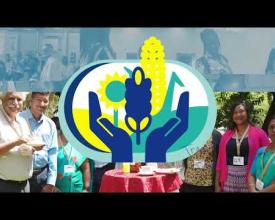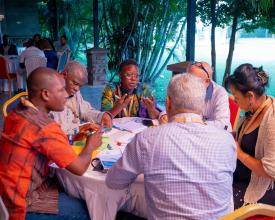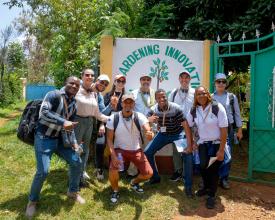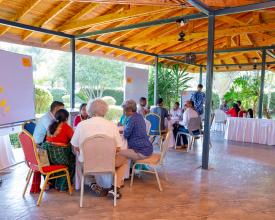
Agroecology Leadership Academy
Nearly 12 million hectares of fertile soil are lost globally every year, leading to serious consequences for the world’s food supply and climate, particularly in the arid regions of Africa, Asia, and Latin America. The inhabitants of these areas, who rely on the land for their sustenance, are the most affected. Over the course of one year, the Agroecology Leadership Academy has collaborated with 38 leaders from seven countries and different agriculture-related sectors to promote agroecological practices aimed at conserving and rehabilitating soil in climate-smart, environmentally friendly ways. The initiative has strengthened individuals, organisations, and networks by enhancing their leadership skills and technical knowledge in agroecology. Participants from Benin, Burkina Faso, Ethiopia, India, Kenya, Madagascar, and Tunisia engaged in various projects, tested innovative approaches, formed alliances, and contributed to shaping transformative processes and narratives for change.
Context
Challenges addressed
The progressive degradation of soil poses serious threats to the world’s food supply. Soil protection and rehabilitation are pivotal to the agroecological transition: As 9 out of 13 agroecological principles directly or indirectly build upon soil protection, the concept offers a holistic solution, also addressing many other ecological and socio-economic issues within the global agri-food system.
However, awareness and understanding of agroecology remain limited worldwide. Advancing agroecological transformation in the face of conventional agricultural systems presents significant challenges. These include anchoring agroecology in laws, regulations and strategies; changing traditional land use practices; addressing weak agricultural extension services; fostering stakeholder cooperation; and overcoming political resistance.
In response to these challenges, the Agroecology Leadership Academy empowered leaders to promote agroecology, navigate complexities, and serve as effective agents of transformation.
Location
Process
Summary of the process
The Agroecology Leadership Academy was a comprehensive learning and development programme for 38 participants from seven countries (Benin, Burkina Faso, Ethiopia, Kenya, India, Madagascar, Tunisia), implemented over 11 months in 2024. Its aim was to empower leaders and transformation agents from the public sector, civil society, private sector, and academia to catalyse sustainable development, navigate complexity, and advance agroecology.
The Academy's success was driven by interrelated elements that complemented and built upon each other. The three key objectives—Learning, Acting, and Networking—were integrated into all activities, supported at the individual, team, and global levels. The Academy's methodology, grounded in principles such as linking agroecology with leadership, transformation initiatives, and strong communication, ensured a holistic approach. The structured phases (Sowing, Growing, Harvesting, and Transforming) provided a clear pathway for progression. International events and online sessions offered essential inputs and tools, fostering leadership and teamwork. Country-specific initiatives facilitated practical application and real-world impact.
Building Blocks
Building Bridges: The Academy’s Multidimensional, Multistakeholder Approach
The purpose of the Academy was to support participants in developing the skills and experience necessary for leadership in navigating complex systems and fostering agroecological transformation.
A suitable concept to fulfill this purpose was developed over a span of three months (July – September 2023):
Consequently, the purpose was distilled into three key objectives: Learning, Acting, and Networking. These objectives were reflected in the design of each session and supported at three levels: individuals, country teams, and the global cohort.
The methodology of the Agroecology Leadership Academy was based on 7 principles:
- A close connection between the topic of Agroecology (the “What”) and Transformation and Leadership (the “How”)
- A clear focus on transformation skills and mindset
- Transformation initiatives as core learning projects
- In-Country facilitators to support the country teams
- Linking Learning, Acting and Networking
- Systemic, experiential and relational learning
- The strong role of communication
The general structure of the Academy was organised into four phases: Sowing, Growing, Harvesting and Transforming. Various learning formats were implemented throughout these phases, including an online kick-off event, two international in-presence learning events, four international online sessions, and individual workshops for the different country teams. These formats concentrated on the aforementioned levels. While the meetings within the country teams emphasised teamwork at the national level, the international sessions facilitated mutual learning among the global cohort.
After the concept development phase, the participant selection process commenced. The goal was to assemble a heterogenous group representing diverse stakeholder groups, skills, ages and genders.
A call for applications was sent out to a pre-defined group of potential participants from agroecology-networks in the respective countries. Following the evaluation of initial applications based on predefined selection criteria, individual selection conversations were conducted to finalise the group composition, with five participants chosen from each country.
In selecting participants, not only individual criteria were considered, but also the need for complementary skills within the group composition. Each participant was expected to contribute something from their personal background that would benefit the group as a whole.
This selection process ensured that different levels of the agricultural and food system were represented - participants included, among others, farmers, founders of agricultural enterprises, university professors, and representatives of ministries of agriculture - as well as ensuring a balanced gender ratio within the group.
Enabling factors
- Utilising a core model developed during the concept development phase, which was introduced at the beginning of the programme and referenced throughout The core model for Agroecology Leadership was designed in a circular format with multiple rings. The centre of the model, Agroecological Transformation, was to be achieved by interweaving elements of the inner circle – leadership elements at various levels – with the outer circle – agroecological principles.
- Implementing a communication action plan to ensure that all participants understood the planned communication tools and materials, alongside establishing frequent communication to share information and include modules on effective communication.
- Involving country focal persons in the development and implementation of the Academy to provide context specific support for both the facilitation team and participants.
- Adapting the Academy’s curriculum based on participants’ needs to ensure those needs were adequately met. Regular feedback from participants was solicited for this purpose.
Lesson learned
- The overall structure and duration of the Academy appeared appropriate. The 11-month duration, combined with a mix of live and online events and transformation initiatives, was beneficial for learning.
- The participant selection process was effective, as invitations sent through agroecology networks attracted two to three times as many applicants as available spots. The application process utilised simple and streamlined forms, and requesting application videos proved helpful in assessing participants.
- Country teams, with diverse representation from various sectors (public sector, start-ups, academia) were highly active and successful. It is essential to emphasise the critical need for farmer representation and participation in forums like this.
- The facilitation team demonstrated adaptability in creating a programme that addressed participants’ learning needs. Rather than establishing a fixed curriculum at the outset, topics were developed based on participant feedback, which proved to be effective.
- Initially intended to focus solely on creating materials such as videos and factsheets, communication activities became integral to all aspects—from the application process and session preparation to facilitation, documentation, and participant management. Therefore, it is recommended to incorporate the strong role of communication consistently into future Academies from the onset.
International Learning Events and Online Sessions
Two international four-day learning events framed the Academy, occurring at its beginning and end. The first event took place in February 2024 in Kisumu, Kenya, as part of the Sowing phase of the Academy. The objective of this event was to bring all participants together for the first time in a spirit of collaborative learning and support. It aimed to introduce the participants to the key concepts of leadership and agroecology while laying the foundation for successful work and group cooperation. During this event, participants began developing stakeholder systems maps to advance agroecology in their countries and collaborated to create a vision for change. Additionally, a field visit took participants to a local demonstration farm (BIOGI) and a farm practicing agroforestry, supported by the NGO Trees for the Future.
After several months of learning in country groups and meeting the global cohort online four times, the second event was held in November 2024 in Hawassa, Ethiopia. This marked the final official activity of the Academy and served as the core event of its Harvesting phase, transitioning participants into the Transforming phase. The key objectives of this event were to support country groups and individuals in taking and scaling up action, to deepen the learning from previous months, to discuss the potential for upscaling the initiatives developed during the Academy, and to celebrate and strengthen the networks that had formed.
During this event, participants reflected on and shared learnings with other country teams, exploring key topics such as personal ecology, individual leadership, habit formation, and communication. A field visit included a tour to a local coffee co-operative processing facility and a diversified small-scale farm. Participants also planned their next steps as transformation makers for agroecological change.
The two international learning events were complemented by a total of four online session, each lasting 2,5 hours, which took place in March, May, July and September 2024. These sessions provided participants with additional insights on models and tools for leading transformation initiatives and advancing agroecology, including effective communication, overcoming obstacles, and influencing political narratives. Thus, these online sessions constituted an important component of the Academy’s Growing phase.
Enabling factors
- Both events featured a highly interactive blend of training and workshops, guided by a pre-set agenda while allowing ample opportunity for participants to influence the programme.
- The translation services provided during both live and online events were seamless. Thanks to the excellent interpreters, particularly at the two learning events, language barriers were effectively addressed.
- Participants appreciated the field trips, which were made possible by hosting the international learning events in cities that offer access to rural areas, rather than in capital cities.
Lesson learned
- While the focus between the two in-presence International Learning Events was on country-specific transformation initiatives, the international online meetings provided an opportunity for the entire group to reconvene, maintain collective momentum, and to share insights with one another.
- Regarding the field trips, it is preferred for future events to concentrate on a single field visit per learning event, dedicating more time, ideally an entire day – to the farm. Effective and timely coordination with country partners is essential to ensure that suitable locations, logistics, and adequate facilities are available on-site.
- The bilingual nature of the events necessitated translation services for all sessions. While this was highly effective during in-person international learning events, the quality of interpretation and the technical setup for translation during online events fell short, creating additional work for facilitators, such as repeating sessions. Therefore, it is recommended to utilise software with easy-friendly translation features (such as Zoom, if permitted by the organising entity of the Academy) and to provide participants with more thorough briefings on overcoming technical challenges.
- Thorough logistical preparation is crucial for international learning events. Participants from various countries need to converge at an appropriate location. Important processes, such as obtaining necessary visas and exploring travel options, should be initiated well in advance.
Country-specific transformation initiatives
During the two international learning events, which took place from February to October 2024, participants were tasked with developing country-specific transformation initiatives to work on collaboratively as a team. This activity constituted the core working stream for action in respective countries and was part of the Academy’s Growing phase. The country teams were responsible for developing and implementing at least one joint project aimed at advancing agroecological transition. The nature and topic of the transformation initiative were intentionally left open. Participants reported their progress through a video presentation and shared their results at the second international learning event held in Hawassa.
Participants expressed a profound depth and intensity of learning throughout these initiatives, particularly in areas such as leadership, teamwork, and agroecology. Most of the initiatives were highly successful and will continue beyond the conclusion of the Academy. For example, in India, a roadmap for agroecological transition was developed for a specific district. In Burkina Faso, a tour for journalists was organised, which helped to raise awareness of agroecology within the country.
Enabling factors
- The initiative provided a general inspiration and framework for the transformation initiatives without being prescriptive regarding their content or processes. This approach allowed participants to learn and self-organise, leading to a greater sense of ownership. Participants noted that this motivated them to develop ideas they felt they could achieve together.
- Each country team received support from a local country facilitator throughout this period. Often, these country facilitators acted as a unifying force for the team and their work on the transformation initiatives. Being from the respective countries, the facilitators understood the local context and were able to offer flexible support to participants. They conducted three to five full-day workshops for each country team as needed, helping the group stay focused on their transformation initiative, addressing specific learning needs, fostering both action and reflection, and providing individual support to participants.
- While the country facilitators supported their teams, they were also guided in their professional development and facilitation skills by the international facilitation team. This team held seven online meetings for all country facilitators during the Academy. Additionally, the lead facilitators conducted approximately seven one-on-one sessions with each country facilitator.
Lesson learned
- Some of the transformation initiatives were overly ambitious at the outset and needed to be scaled back. It is recommended to schedule group coaching session at the beginning of the work on the transformation initiatives to help participants assess the feasibility of their projects.
- Including the country facilitators in the international learning events is also recommended, allowing them to collaboratively initiate and conclude the country work alongside their teams during these events. Alternatively, a day-long online onboarding session with the facilitators could be arranged at the beginning of the process.
- Communication from the organisations organising the Academy regarding options for sustaining and funding the continuation of the transformation initiatives should begin early in the process and remain consistent and proactive. It is advisable to explore ways to actively support networking opportunities for participants with potential funders of their transformation initiatives from the outset.
Evaluating and Disseminating Outcomes for Continuous Improvement and Sustainability
Another key component of the Agroecology Leadership Academy was the regular evaluation of its outcomes. Participants were frequently surveyed about their experiences with the Academy, its content, and their personal progress. This feedback was utilized not only to adapt the Academy's programme flexibly to meet the demands of the participants - an aspect previously identified as a success factor in other building blocks – but also to evaluate the entire programme more effectively and derive lessons learned for potential future academies. After the Academy concluded, these findings were compiled and discussed in an internal workshop involving the implementing organisations. The lessons learned, along with other relevant materials, are shared on various platforms, particularly Agroecology TPP, to assist organisations in planning and implementing similar projects. Additionally, the project was presented in a public webinar upon completion. During this webinar, Academy participants had the opportunity to showcase their transformation initiatives, providing a valuable chance to expand their networks and enhance the sustainability of the Academy.
Enabling factors
- The regular collection of feedback from participants not only allowed for real-time adaptations of the Academy programme but also served as the foundation for the internal evaluation workshop held after the Academy’s conclusion. The feedback addressed a wide range of aspects related to the Academy, including content, formats, logistics, learning experiences, and more, in order to achieve a more comprehensive evaluation at the end.
- It is important to note that the webinar following the Academy provided a platform not only for the implementing organisations to present the Academy itself, but also, and importantly, for the Academy participants to present the initiatives they had developed. This fostered engagement beyond the Academy’s boundaries and enabled participants to forge new connections that could be beneficial for furthering their initiatives.
Lesson learned
- While some surveys yielded helpful insights, others unfortunately had low response rates. It is therefore advisable to use brief surveys with no more than 10 questions at the beginning of the Academy and after each international learning event.
- The planning of follow-up activities should include considerations for how this Academy could be adopted by other institutions, follow-ups on the country transformation initiatives, and strategies for further embedding the Academy in the countries involved. It is recommended to develop a clear action plan aimed at maximising the sustainability of the Academy approximately nine months before its conclusion.
Impacts
The anticipated benefits for the Academy participants were as followed:
- Enhancement of their technical knowledge in agroecology and development of leadership skills.
- Becoming part of a supportive network of change-makers
- Receiving support to advance their own change projects and initiatives
- Opportunities for personal and professional learning and development in leading and fostering innovation and transformational change in the agroecology sector.
- Gaining knowledge on how to engage diverse stakeholders to achieve common goals
- Establishing connections with a global peer group of action learners.
- Capacity building that enhances their careers and expands their networks.
- Acquiring kknowledge and skills in systems thinking and innovation
Many participants expressed a very high level of overall satisfaction, appreciating the Academy’s structure, networking opportunities, and relevance to their work. Participants reported significant satisfaction with the Academy’s impact on professional and personal growth, and overall confirmed the achievement of the above-mentioned anticipated benefits.
The transformation initiatives stood out as a key highlight in the learning process, with participants noting a profound depth and intensity of learning in areas such as leadership, teamwork, and agroecology. Most of these initiatives were very successful and will continue beyond the conclusion of the Academy.
Beneficiaries
Participants of the Academy came from a range of different sectors, including:
- Farming
- Research
- Ministry of Agriculture
- NGO
- Agricultural organisation
- Private sector
- Extension work
Sustainable Development Goals
Story
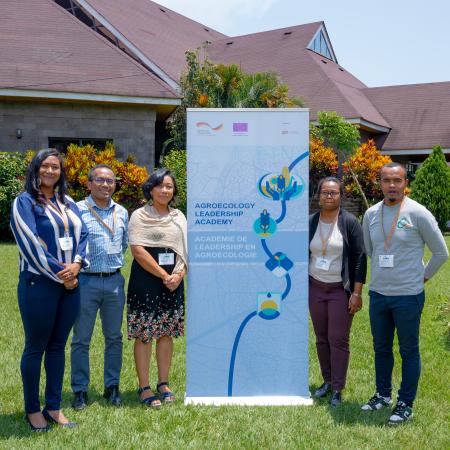
Transformation Initiative Madagascar:
“In Madagascar, the transformation initiative is called MITABE, a Malagasy term that signifies a movement of group solidarity to advocate for a cause. MITABE stands for “Mouvement et Initiatives pour la Transition Agro-Biologique et Agro-Ecologique des systèmes agricoles et alimentaires à Madagascar”.
Prototyping was initially implemented at the regional level to enhance the understanding of agroecology and replicate it in other regions, with the potential for national scalability. One of our strengths lies in our ability to leverage our skills, relationships, and diversity to unite various stakeholders in support of the movement.
The initiatives were launched in the simplest manner possible. We began with a workshop to kick off the movement, accompanied by awareness-raising campaigns and announcements on national television. Additionallly, we organised a temporary agroecology market featuring various stakeholders, as well as significant participation in agroecology events.
Transformation requires time and catalysts, and we have embraced the role of catalysts. This is not an easy task. Despite facing resistance to change, we are confident that the seeds we have sown will eventually bear fruit.
We have successfully planted the seeds of agroecology, particularly as part of a transformation process. This endeavour requires time, extending beyond an 11-month timeframe. Therefore, o we will continue our MITABE initiative to foster genuine political, social, and environmental change, as well as economic development within our country, all while advancing agroecology.”
